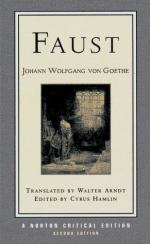[Footnote 7: “Famulus” seems to mean a cross between a servant and a scholar. The Dominie Sampson called Wagner, is appended to Faust for the time somewhat as Sancho is to Don Quixote. The Doctor Faust of the legend has a servant by that name, who seems to have been more of a Sancho, in the sense given to the word by the old New England mothers when upbraiding bad boys (you Sanch’!). Curiously enough, Goethe had in early life a (treacherous) friend named Wagner, who plagiarized part of Faust and made a tragedy of it.]
[Footnote 8: “Mock-heroic play.” We have Schlegel’s authority for thus rendering the phrase “Haupt- und Staats-Action,” (literally, “head and State-action,”) who says that this title was given to dramas designed for puppets, when they treated of heroic and historical subjects.]
[Footnote 9: The literal sense of this couplet
in the original is:—
“Is he, in the bliss of becoming,
To creative joy near—”
“Werde-lust” presents the same difficulty
that we found in note 3. This same word, “Werden,”
is also used by the poet in the introductory theatre
scene (page 7), where he longs for the time when he
himself was ripening, growing, becoming, or
forming, (as Hayward renders it.) I agree with
Hayward, “the meaning probably is, that our Saviour
enjoys, in coming to life again,” (I should
say, in being born into the upper life,) “a
happiness nearly equal to that of the Creator in creating.”]
[Footnote 10: The Angel-chorusses in this scene present the only instances in which the translator, for the sake of retaining the ring and swing of the melody, has felt himself obliged to give a transfusion of the spirit of the thought, instead of its exact form.
The literal meaning of the first chorus is:—
Christ is arisen!
Joy to the Mortal,
Whom the ruinous,
Creeping, hereditary
Infirmities wound round.
Dr. Hedge has come nearer than any one to reconciling meaning and melody thus:—
“Christ has arisen!
Joy to our buried Head!
Whom the unmerited,
Trailing, inherited
Woes did imprison.”
The present translator, without losing sight of the fact that “the Mortal” means Christ, has taken the liberty (constrained by rhyme,—which is sometimes more than the rudder of verse,) of making the congratulation include Humanity, as incarnated in Christ, “the second Adam.”
In the closing Chorus of Angels, the translator found that he could best preserve the spirit of the five-fold rhyme:—
“Thaetig ihn preisenden,
Liebe beweisenden,
Bruederlich speisenden,
Predigend reisenden,
Wonne verheissenden,”
by running it into three couplets.]
[Footnote 11: The prose account of the alchymical process is as follows:—
“There was red mercury, a powerfully acting body, united with the tincture of antimony, at a gentle heat of the water-bath. Then, being exposed to the heat of open fire in an aludel, (or alembic,) a sublimate filled its heads in succession, which, if it appeared with various hues, was the desired medicine.”]




